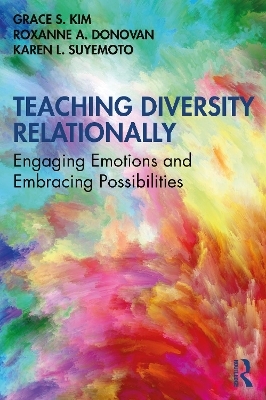
Teaching Diversity Relationally
Routledge (Verlag)
978-0-367-18119-2 (ISBN)
Teaching Diversity Relationally: Engaging Emotions and Embracing Possibilities offers process-oriented guidance for negotiating the psychological and relational challenges inherent in teaching about race, privilege, and oppression. Grounded in the philosophy of Transformative Education and incorporating psychological theories, the authors present concrete strategies for effectively teaching diversity and social justice courses.
The authors develop an intersectional social justice framework for Transformative Education that emphasizes five emotional-relational pillars of successful teaching for diversity: cultivating reflexivity and exploration of positionality; engaging emotions; fostering perspective taking and empathy; promoting community and relational learning; and encouraging agency and responsibility. They provide guidance on how to prepare for social justice education that fosters the growth of learners and educators by addressing intersecting levels of engagement—intrapsychic (within individual students and educators), relational (between students, between faculty and students), and group dynamic.
Teaching Diversity Relationally follows the developmental arc of a diversity course across a semester, exploring how students respond as the course moves into deeper content material and more intense discussions. The authors describe the psychology behind these responses, and offer best practices for different points in the semester to facilitate learning, manage class dynamics, build connections among students, and prevent faculty burnout.
Teaching Diversity Relationally addresses the teaching process in diversity courses. The authors' companion text, Unraveling Assumptions: A Primer for Understanding Oppression and Privilege provides the foundational content for university courses that can be expanded upon with a range of disciplines. Unraveling Assumptions offers an introductory exploration of power, privilege, and oppression as foundations of systems of inequality and examines complexities within meanings and lived experiences of race, ethnicity, gender, sexuality, disability, and social class.
Grace S. Kim is Clinical Associate Professor in the department of Counseling Psychology & Applied Human Development at Boston University. Roxanne A. Donovan is a licensed psychologist and Professor of Psychological Sciences jointly appointed in Interdisciplinary Studies at Kennesaw State University. Karen L. Suyemoto is Professor of Psychology with affiliations in Asian American Studies and Critical Ethnic and Community Studies at the University of Massachusetts Boston.
1: Purpose, Postulations, and Positionalities
Section One: Foundations
2: Transformative Education: Purpose, Process, and Psychology
3: Psychological Pillars of Transformative Education: Emotional and Relational Processes
Section Two: Transformative Education Across the Arc of a Semester
4. Before You Begin: Proactive Planning for Effective Transformative Education
5. The First Week(s): Establishing a Relational Learning Community
6. The Beginning Arc: Establishing Foundations
7. The Middle Arc I: Holding Emotional Intensity and Struggle
8. The Middle Arc II: Facilitating Brave Conversations (aka Difficult Dialogues)
9. The Middle Arc III: Promoting Empathy and Hope
10. Endings and New Beginnings: Encouraging Agency and Sustaining the Journey
Section Three: Considering Contexts and Conclusion
11. Considering Contexts: Geography, Institutional Nature, Student Diversity, Faculty Rank
12: Final Thoughts: Our Hopes for Your Future
| Erscheinungsdatum | 13.06.2022 |
|---|---|
| Zusatzinfo | 3 Tables, black and white; 2 Line drawings, black and white; 2 Illustrations, black and white |
| Verlagsort | London |
| Sprache | englisch |
| Maße | 152 x 229 mm |
| Gewicht | 503 g |
| Themenwelt | Geisteswissenschaften ► Psychologie ► Allgemeine Psychologie |
| Geisteswissenschaften ► Psychologie ► Pädagogische Psychologie | |
| Geisteswissenschaften ► Psychologie ► Sozialpsychologie | |
| Sozialwissenschaften ► Pädagogik ► Bildungstheorie | |
| Sozialwissenschaften ► Soziologie ► Gender Studies | |
| ISBN-10 | 0-367-18119-3 / 0367181193 |
| ISBN-13 | 978-0-367-18119-2 / 9780367181192 |
| Zustand | Neuware |
| Haben Sie eine Frage zum Produkt? |
aus dem Bereich


